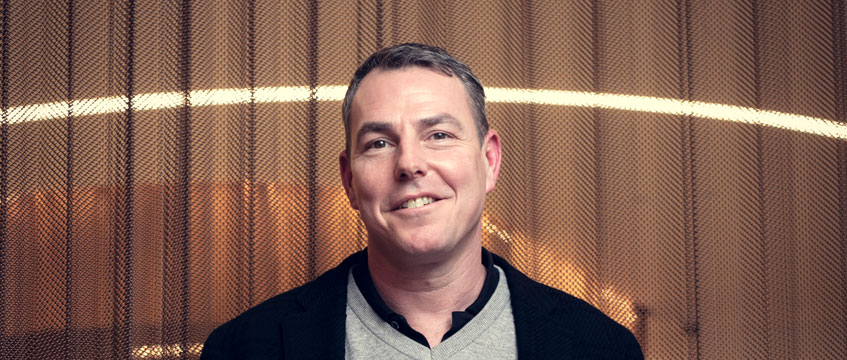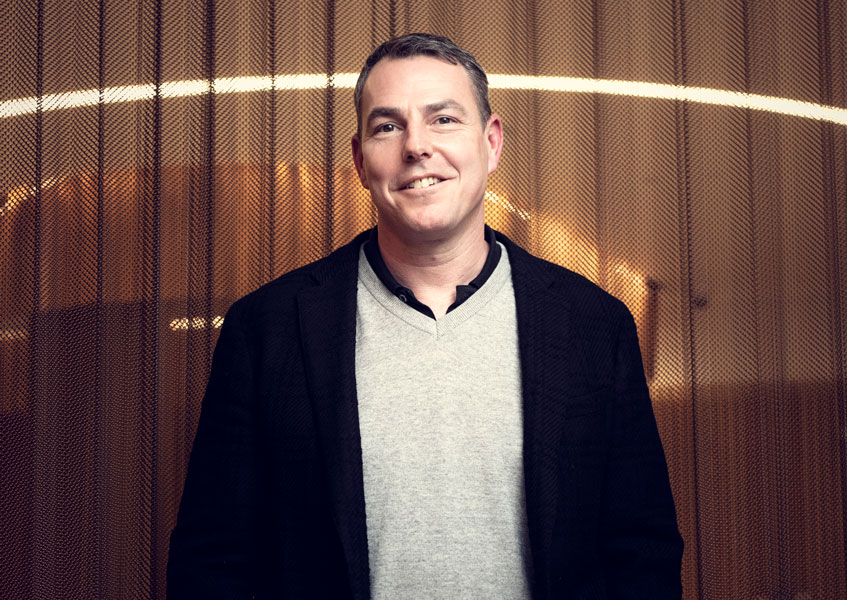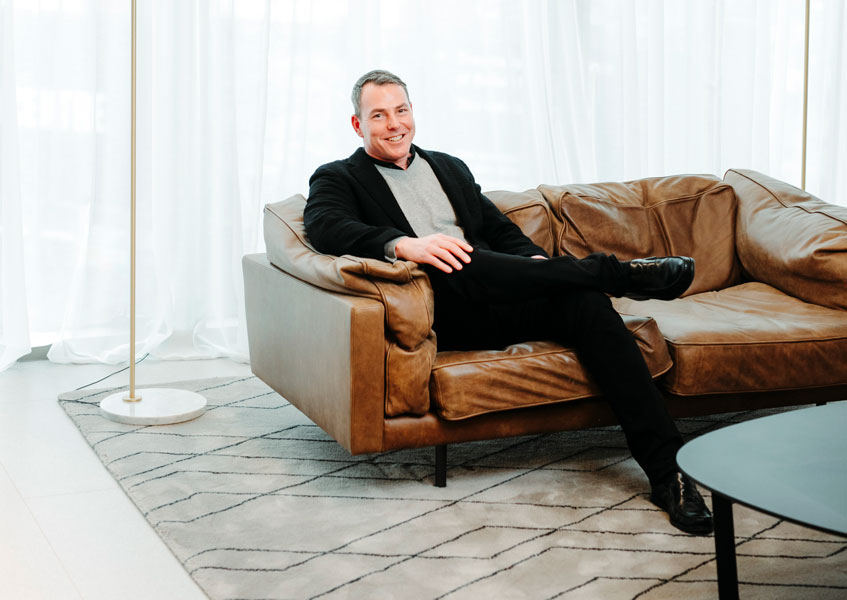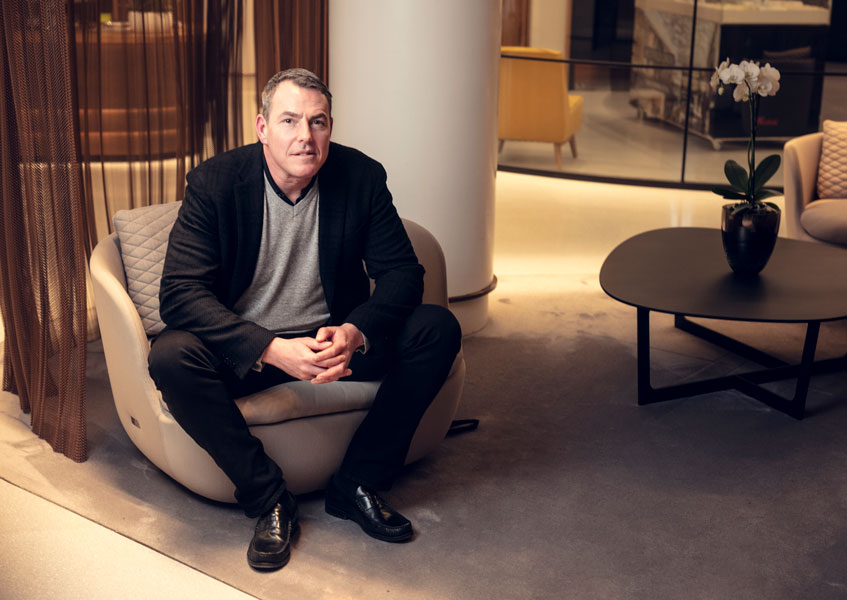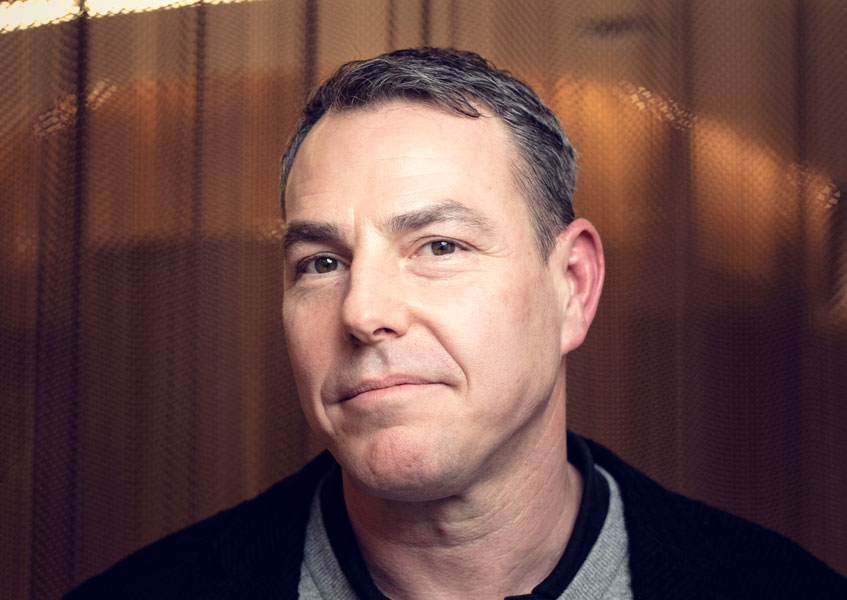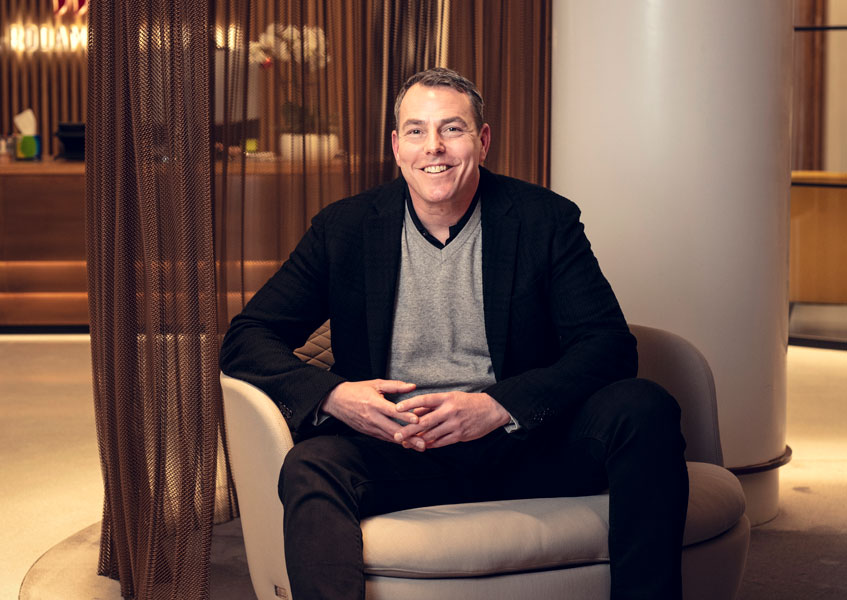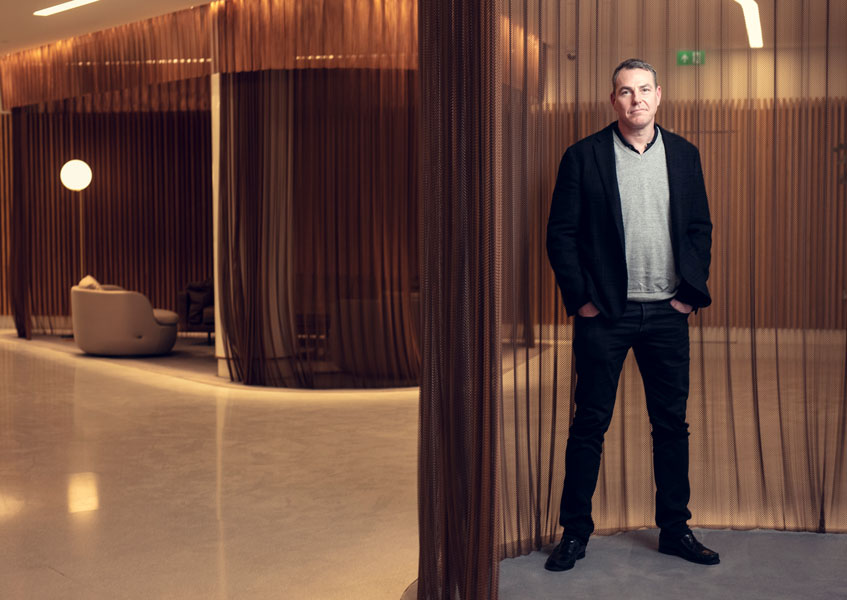Nearly five months into his new job at Unibail-Rodamco-Westfield, Scott Parsons reflects on why he decided to stay in retail, diversity in the profession and his learnings from Landsec, in an exclusive interview with EG.
Scott Parsons, Unibail-Rodamco-Westfield’s regional managing director for the UK and Italy, is used to dealing with tough winter cycles. Growing up in Canada, Parsons used to wait for the school bus in temperatures of -35˚C while “dodging the bears”, he jokes.
Arguably, there is no better person to take charge of two of the UK’s most prominent shopping centres – Westfield London, at White City, and Westfield Stratford City – at a time when retail is metaphorically enduring some of the harshest conditions it has ever faced.
When EG sits down to chat with Parsons at URW’s offices at Westfield London, four months into his new role, coronavirus is only just starting to spread in the UK.
“I feel bad for UK retail because, if it gets worse, retailers don’t need another kick in the teeth in this perfect storm. The timing is rubbish,” Parsons tells EG.
However, in the weeks to come, the unprecedented pandemic will ravage retail and leisure destinations; landlords will scramble to shore up their finances, to offset big shortfalls in rental income.
In Westfield’s case, both centres will be largely shut, except for their grocery stores and pharmacies. Tenants will be able to switch to monthly payments, from quarterly.
URW’s own senior management teams will take a pay cut of up to 25%, with senior executives in the US and Europe reducing base pay by 20%. The unpaid amount will be donated to support efforts fighting the coronavirus crisis.
A new toy box
Before resigning from Landsec last year, Parsons spent nearly a decade at the REIT. From 2014, he was appointed to lead the landlord’s £6.3bn retail, leisure and hotels portfolio.
He joined URW in November. “It’s good to get back into the swing of things,” he says.
Parsons says half of his friends were bemused at his decision to stay in retail, given his experience in various sub-sectors. As well as overseeing Landsec’s London portfolio for five years until 2014, previous roles include president of European real estate at Brookfield Asset Management and head of business development at GE Capital Real Estate.
However, other friends noted that Parsons now has “the best toys to play with”. With both properties in London, URW has also managed to dodge the pitfalls that other retail landlords are facing in regional markets, where it is harder to stave off declines in demand.
“It seemed like a logical progression, to come to what I see as the two best retail assets in Europe,” he says, adding: “There’s a lot of talk about the struggles of UK retail. We’re not players in UK retail. We’re players in London retail, and that’s a great place to be.”
Parsons also enjoys the customer-facing aspects. “I’m thinking about my customers’ customers so much more than when I was looking after office properties,” he says.
“With offices, you’re still trying to design and build the right kit to appeal to occupiers and their customers, but you’re not living and breathing it every day.
“You sign a 15-year lease on 200,000 sq ft of office space and the chances are you’re not going to think too much about your customer for the next nine years or so until lease renegotiation. Whereas here, with more than 80m people coming through our doors every year, you’re [immersed in] it.”
We’re not players in UK retail. We’re players in London retail, and that’s a great place to be
Landsec’s teachings
One of the key learnings that Parsons has carried across with him from Landsec is how important it is to build the discipline to look further into the future.
“In property, and probably in any job, there’s always the tendency to look at what fires you have to fight today… and the numbers in the five-year business plan,” he says.
“It sounds like I’m stating the obvious, but you have to be strategic and try to think about what the needs of your customers are going to be, and how the market will evolve over 15 years,” he adds. “It’s not necessarily about taking the quick buck.”
He uses the long-awaited Westfield Croydon scheme, which URW jointly owns with Hammerson under The Croydon Partnership, as an example.
“Every stakeholder in Croydon would agree that plonking a big spaceship, inward-looking shopping centre into the middle of Croydon might have been the dream answer 10 years ago, but it’s not today,” says Parsons.
Although URW removed the Croydon scheme when it cut €3.2bn (£2.9bn) of projects from its development pipeline in February, Parsons downplays the significance of the move.
“We all know the scheme is going to change,” says Parsons. “You don’t stick something in your official financial results that talks about a scheme you know you’re not going to deliver in the same format.”
Parsons says there is scope to add residential, student housing, hotels and more leisure to the scheme, supported by Croydon’s infrastructure and growth potential.
“I still see great potential for a retail, food and beverage and leisure destination, but rather than that as the be-all and end-all, it’s going to be so much more,” he says.
At the time of writing, The Croydon Partnership’s project teams still meet formally once a month; board meetings take place quarterly. “We’re always meeting and working together to bring things forward,” Parsons says, adding that it has an “open dialogue” with the Whitgift Foundation, the council and the Greater London Authority. “We’ll do whatever makes the most sense for Croydon.”
We’re used to being in the front line, with 80m people every year – with PRS, that customer service mindset will serve us well
Mixing it up
Among the group’s standing assets, like-for-like net rental income dropped by 4.2% across the White City and Stratford centres during its 2019 financial year. This was partly down to 10-year lease expiries creating higher vacancy, and lower rents from tenants in a CVA or administration.
Like many landlords, URW is shifting away from the overall decline in retail values and income through a mixed-use strategy. This is largely geared towards a young professional demographic.
At Westfield London, Parsons says it is considering options for offices and a mid- to upper-market hotel. There is a strong likelihood that one of its department stores – which include House of Fraser and Debenhams – will be repurposed into office space within the next 18 months.
The landlord is also set to begin its second phase of office development at Stratford and has “keen interest” in building a third hotel there.
These would sit alongside its €750m private rented sector scheme at Stratford, which it is developing in a jv with Canada’s PSP Investments and QuadReal Property Group, as the Cherry Park Partnership.
“We’re used to being in the front line, with 80m people every year – with PRS, that customer service mindset will serve us well,” says Parsons.
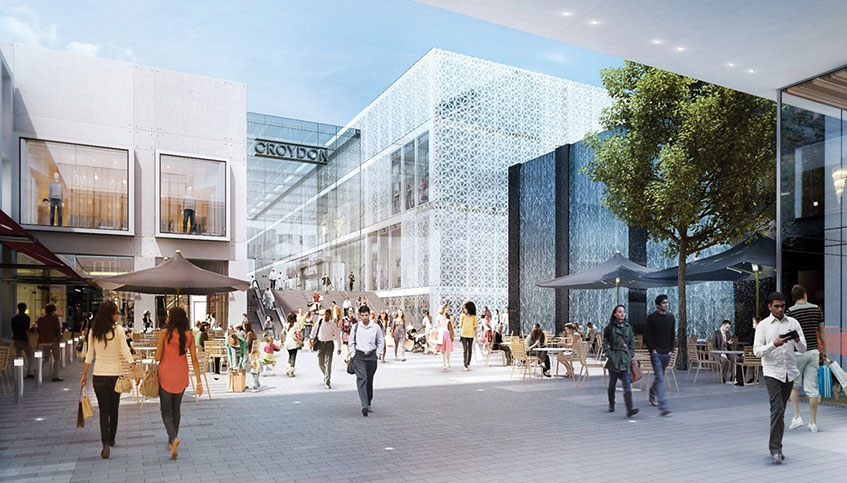
Shaking a reputation
Parsons says the UK and Italy business operates largely autonomously from its Paris-based head office on a day-to-day basis. Nonetheless, the London centres receive a lot of attention, as its poster children – “there are probably more investor tours through Westfield London than there are through almost any other shopping centre”, Parsons reckons.
After Unibail-Rodamco’s merger with Westfield Corporation in 2018, much of the legacy senior Westfield Corporation team had left by the time Parsons took up the job.
Although he inherited several projects upon joining URW, he now has an almost blank slate to work with in terms of how the team operates.
“That was one of the things that really appealed to me about the role,” Parsons says. He is now focusing on “capturing the best of both worlds”.
“I think the Westfield model was so entrepreneurial, so customer-focused, and dare I say relied a little bit on gut feeling and drive,” he says.
“The Unibail-Rodamco model is incredibly disciplined, financially savvy, analysis-focused, and has capable asset managers. If we find the perfect middle ground, we will be an unstoppable force in retail property.”
Because we’re talking to retailers which are increasingly global about so many different markets, you forge a much stronger relationship. It makes the bigger deals a little bit more possible
In the years before the takeover, Westfield had developed a reputation for its somewhat aggressive stance towards its occupiers on rents.
As an outsider at the time, Parsons acknowledges there is “a grain of truth” to this. But now that he is on the inside, he says he has a “wholly different” interpretation. Nowadays, he views it as confidence.
“I think there was so much pride in these two wonderful toys that occasionally it could come across as an aggressive negotiation tactic,” he says. “Really, it was just a solid belief in our product.”
Nonetheless, Parsons recognises that URW’s retailers are struggling, even if their top-performing stores tend to be at either Westfield centre. “You’ve got to listen to what they’re going through and try and help them succeed in their business model,” he says.
While rent decreases at the UK Westfield centres have been “hard to characterise on a case-by-case basis”, minimum guaranteed rent went up by 11.1% in the UK, according to the company’s latest results, unveiled in February.
The centres operate with a 3-6% asset management void, to keep the tenant mix relevant. Being part of a global group also helps with this, through the scope for multi-centre leasing deals. “It brings a lot of opportunities,” says Parsons, although he caveats this by saying that deals “never work” if retailers are told they can only open in one location on the condition that they open at others.
“Because we’re talking to retailers which are increasingly global about so many different markets, you forge a much stronger relationship,” he says. “It makes the bigger deals a little bit more possible.”
Diverse thinking
The diversity agenda is an issue close to Parsons’ heart. “It’s something that I, personal life aside, have always been passionate about,” he says. At Landsec, he was the board’s diversity sponsor.
In his view, diversity in real estate over the years has “come quite a long way, but there is still so much further to go”.
“I look at our two centres and the people coming through our doors every year – they are not all 47-year-old, white, straight chartered surveyors,” he says. “To make a diverse, interesting and thriving destination, you need to cater for all.”
A big part of this will rely on URW’s ability to attract and retain talent. “If I don’t get the talent pool within our organisation that embraces everyone, how can I, or my teams, create the destinations that will be of interest to everyone?” Parsons asks.
On the recruitment front, the key traits that Parsons looks for are creativity and boldness. “I don’t think it’s any secret that when we added the extension onto Westfield London, we moved some tenants to those big bright new units,” he says. “There are less than half a dozen left that we have to backfill.
“Given the sentiment at the moment, we’re going to have to be quite creative in filling those units. That requires ingenuity, an open-mindedness and a bit of innovation that perhaps wasn’t as necessary five years ago when these were 100% full.”
If I don’t get the talent pool within our organisation that embraces everyone, how can I, or my teams, create the destinations that will be of interest to everyone?
Full circle
Bold minds will also be needed to help steer the centres into the future for retail – one that could feasibly lead to a fully circular economic model. While it could be argued that this outcome might render shopping centres irrelevant, Parsons says real estate can still play a part in this.
“On the innovation front, we’re thinking about that a lot,” he says. “If you’ve got a big, thriving destination, your capacity to drive forward the sustainability agenda is far greater.”
Giving an example, Parsons cites a “handbag clinic” that recently caught his eye on King’s Road, Chelsea, which reconditions bags for people to either keep or sell on.
“When you’ve got the critical mass that we’ve got in our two centres, the scope for that is incredibly deep,” he says. “Even if every sale ends up being on a phone or tablet, brands will still need a physical forum to engage with customers.”
It remains unclear just how far off this future could be. But by that point, Parsons hopes he can look back at his career at URW and see that he has “really increased the diversity” of his team.
“I would love for the two centres to be chock-a-block full, and for occupiers of all shapes and sizes to be queuing up at the door,” says Parsons. He also wants to have overseen big increases in mixed uses at the centres under his remit. “And at least some spades in the ground in Croydon,” he jovially adds.
Not long from now, Parsons will be swamped with tough decisions to make, as disruption from the coronavirus pandemic deepens.
Beyond the immediate fires to put out, the future for retail as we know it will be unclear. The pandemic could fundamentally alter the way consumers view bricks-and-mortar retail. And analysts will warn that thousands of shops across the UK may never reopen after the government’s lockdown.
Nonetheless, Parsons seems to know a thing or two about renewal. It is an energy that the sector will need again, once retail dusts off this punishing winter and starts to see the green shoots of spring.
To send feedback, e-mail pui-guan.man@egi.co.uk or tweet @PuiGuanM or @estatesgazette







